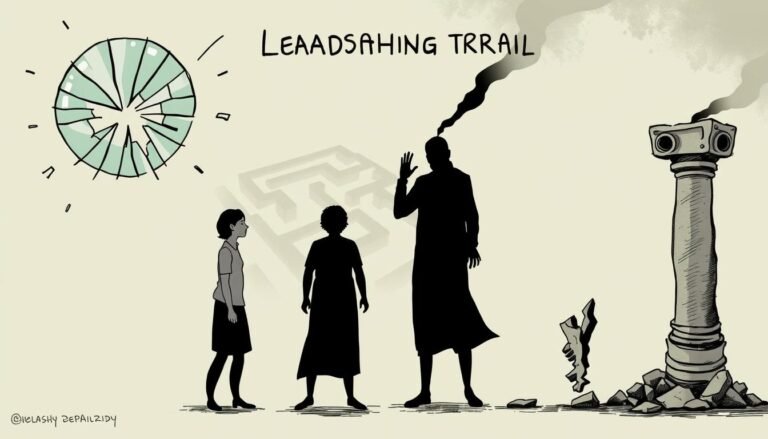Quantum Psychology in Organizational Contexts
Quantum psychology is changing how we see work. It mixes quantum mechanics with how groups work. This new view is altering our understanding of making decisions, leading, and adapting in companies.
Linear thinking is no longer the norm. We now see how everything in a company is linked. This new way of seeing helps us understand workplace relationships in a fresh way.
Studies show time is key in how companies function. How we view time impacts our work understanding. This is important for both personal and company culture.
Change in companies isn’t just about now or the past. The future can be very different. That’s why we need quantum psychology to grasp and manage growth and change.
Key Takeaways
- Quantum psychology offers a new way to understand workplace dynamics
- It challenges old, linear ways of thinking about organizations
- Time perception is crucial in organizational processes
- The quantum approach helps manage unpredictable changes
- It provides insights for effective organizational evolution
- Quantum views can improve decision-making and leadership
Understanding the Foundations of Quantum Psychology in Business
The move from classical to quantum thinking in Business Psychology is a big change. It brings new views on how workplaces work, going beyond old ways.
The Evolution from Classical to Quantum Thinking
Quantum Thinking in business came up because workplaces got more complex. A Microsoft study found 52% of workers used devices more after COVID-19. Also, 40% felt more anxious and depressed. This shows we need new ideas in Organizational Theory.
Core Principles of Quantum Psychology
Quantum psychology started with the Quantum Field Theory in 1984. It sees consciousness as a basic thing. This view gives us new ways to see how people act at work and how groups work together.
For example, the Psycanics Being Transformation Technology aims to solve mental health problems fast. It might help in making work places better for everyone’s mental health.
Integration with Organizational Behavior
Using quantum ideas in Organizational Behavior can help solve work problems. For instance, knowing how social isolation affects gig workers can help support them better. They face unique stress like unpredictable pay and job uncertainty.
Seeing organizations as energy fields can lead to better ways to keep employees happy and change the company for the better.
Time Perception and Organizational Change
Time perception is key in organizational change and planning for the future. Studies show our view of time is not set in stone. This new understanding can change how we manage time in business.
Research finds time perception differs among species and time lengths. For short to medium times, how we see time changes in a straight line. This shakes up old ideas on managing time in companies.
In the world of organizational change, this knowledge is a big deal. Companies can use it to make better plans for change and handling urgent projects.
“The judgment of a given interval depends on both the non-temporal properties of stimuli defining the interval and the task used.”
This quote shows how complex time perception is in work settings. Things like the task, environment, and who you are can change how we see time during big changes.
| Factor | Impact on Time Perception | Implications for Organizational Change |
|---|---|---|
| Sensory Modality | Can alter duration judgment | Consider multisensory approaches in change communication |
| Emotionality | Influences perceived duration | Manage emotional aspects of change processes |
| Familiarity | Affects time estimation | Gradually introduce new processes for better adaptation |
Understanding these details about time perception helps companies plan better for change. This fits with today’s views on change and planning for the future.
Quantum Psychology in Organizational Contexts
Quantum psychology is changing the business world. It brings new ideas to Leadership Development, Employee Engagement, and decision-making. This approach offers fresh solutions to old problems.
Applications in Leadership Development
Quantum principles are changing leadership training. Leaders learn to adapt quickly and embrace new leadership styles. This helps them handle uncertain business landscapes better.
Employee Engagement Through Quantum Principles
Quantum psychology boosts Employee Engagement. It focuses on connections and potential. This view creates a more unified and motivated workforce.
Employees feel more valued and connected to their work and colleagues.
Decision-Making in Complex Systems
In Complex Systems, quantum models are key. They offer nuanced strategies for uncertainty. This helps leaders make better choices in tricky situations.
| Aspect | Traditional Approach | Quantum Approach |
|---|---|---|
| Leadership Style | Fixed and hierarchical | Adaptive and emergent |
| Employee Engagement | Individual-focused | Interconnected and potential-focused |
| Decision-Making | Linear and predictable | Probabilistic and nuanced |
Quantum psychology in organizations opens new doors. It offers fresh ways to develop leaders, engage employees, and make decisions. This approach helps businesses thrive in today’s complex world.
The Quantum Field Theory in Corporate Settings
Quantum Field Theory gives a new way to see corporate culture and energy. It sees companies as dynamic fields, like quantum fields in physics.
Organizational Fields and Energy Dynamics
In the business world, energy flows make unique patterns. These patterns affect how teams work and talk. A study on Semco, a Brazilian company, shows this clearly.
Semco uses flat structures and trust-based systems. This matches quantum principles of fluid interactions.
Collective Consciousness in the Workplace
Quantum thinking shows how group awareness works in companies. At Semco, making decisions together is important. This creates unity and purpose.
It’s like the collective fields in quantum physics. Here, particles affect each other even when far apart.
System Constraints and Potentialities
Quantum Field Theory uncovers hidden potential in organizations. It shows how limits can spark creativity. Semco’s flexible strategy allows for quick changes.
This is similar to quantum systems where new states appear under certain conditions.
| Aspect | Traditional View | Quantum View |
|---|---|---|
| Structure | Rigid hierarchy | Fluid networks |
| Decision-making | Top-down | Participative |
| Energy flow | Linear | Dynamic fields |
| Potential | Fixed resources | Emergent capacities |
By using Quantum Field Theory, companies can explore new ways to think about energy and growth. This change could lead to more adaptable and lively corporate cultures.
Mindfulness and Quantum Leadership
Quantum leadership offers a new way to think about work. It combines logic and emotion for a complete management approach. This method focuses on how everything is connected, a core idea in quantum thinking.
Mindfulness is key in this new leadership style. It helps leaders stay in the moment and make choices without bias. Research from the Journal of American Science shows that mindfulness leads to better work behavior.
Quantum leaders use data but also care about feelings. They know that every action impacts the whole system. This mix leads to smarter choices in complex business settings.
“Mindfulness in leadership is about being fully present and aware of yourself and others.” – Dr. Ellen Langer, Harvard psychologist
Studies show that mindful leaders build stronger team bonds and boost worker engagement. They handle change well, which is crucial in today’s fast business world.
Using quantum leadership can change how a workplace feels. It promotes:
- Open communication
- Creative problem-solving
- Improved employee well-being
- Stronger organizational resilience
By adopting mindfulness and quantum leadership, companies can build a more aware and harmonious work place. This approach boosts business results and helps employees grow personally.
Organizational Potentiality and Future States
Organizational Development gets a new twist with quantum psychology. It opens up exciting possibilities for Future Planning and Adaptive Strategies.
Emergence of New Capacities
Quantum theory says organizations have untapped potential. It sees the future as full of possibilities, unlike traditional views. Companies can grow new abilities by embracing uncertainty and exploring these possibilities.
Resource Development through Quantum Principles
Quantum principles bring new insights to managing resources. Instead of just using what they have, organizations can find hidden reserves. This leads to innovative thinking and creative problem-solving, bringing unexpected breakthroughs in Organizational Development.
Adaptability in Uncertain Environments
In today’s fast world, being adaptable is crucial. Quantum psychology helps companies think flexibly, thriving in change. By seeing challenges as chances, organizations can develop strategies that turn uncertainty into an advantage.
“The future offers many potentialities which require the enactment of individual, social, and environmental events.”
Using quantum principles in Future Planning lets organizations shape their future. By seeing everything as connected, companies can make strategies that are strong and flexible to change.
| Traditional Approach | Quantum Approach |
|---|---|
| Linear thinking | Non-linear possibilities |
| Fixed resources | Emergent capacities |
| Reactive strategies | Proactive adaptation |
By adding quantum psychology to Organizational Development, companies can unlock new potential. They can face uncertain futures with confidence. This approach turns challenges into chances for growth and innovation.
Change Management Through Quantum Lens
Change management is changing. Old ways of thinking about growth are fading. Quantum strategies bring a new view on adapting and growing.
Old change models don’t work in today’s fast world. They’re too fixed and one-way. Quantum thinking welcomes uncertainty and looks at many options at once. It knows that over 80% of what managers see is influenced by their own views.
Quantum strategies for change management include:
- Quantum seeing: Looking beyond surface-level issues
- Quantum thinking: Considering multiple outcomes
- Quantum feeling: Tapping into collective emotions
- Quantum acting: Taking bold, decisive action
These skills help leaders deal with change’s complexities. They move away from old views of management. Instead, they see organizations as living systems.
“In the quantum world of business, change is not a straight line. It’s a web of possibilities waiting to be explored.”
By using quantum strategies, companies can adapt and stay strong. They’re ready for today’s unpredictable markets. This way, change becomes a chance for growth and new ideas.
The Role of Consciousness in Corporate Culture
Corporate culture shapes how organizations work. It’s influenced by collective consciousness, which is key in decision-making and group dynamics. Understanding this connection can lead to powerful changes in organizations.
Collective Decision-Making
A study of 322 leaders across industries found a strong link. A clear purpose leads to positive outcomes. This shows how collective consciousness affects decisions in companies.
Group Dynamics and Quantum Effects
Leader consciousness of connectedness greatly affects a company’s climate. This quantum-like effect spreads through the company. It impacts social, environmental, and economic outcomes.
The study found that developing leader consciousness is crucial. It helps improve stakeholder value through ESG initiatives.
Cultural Transformation Processes
Organizational transformation often starts with shifts in collective consciousness. The Spiral Dynamics model by Clare Graves shows human consciousness evolves in stages. Each stage has a unique worldview that shapes corporate culture.
By understanding these stages, leaders can guide their organizations through cultural transformations.
“The various systems in Spiral Dynamics can be referred to as valuing systems, paradigms, worldviews, mindsets, perceptual systems, decision-making frameworks, values, or cultural memes, each characterized by a unique orientation.”
Recognizing the role of consciousness in corporate culture opens new avenues for growth. It encourages leaders to create environments that nurture collective consciousness. This leads to more aligned and effective corporate cultures.
Implementing Quantum Psychology Practices
Quantum Psychology Implementation is becoming more popular in today’s business world. Over 50% of global companies now match their plans with U.N. Sustainable Development Goals. This shows a big shift towards new ways of working.
This change is similar to the big steps forward in other areas like health and wealth. Life expectancy has doubled, and extreme poverty has dropped a lot in the last 200 years.
In business, ideas from quantum theory like complementarity and entanglement are being used to make teams work better. These ideas are especially useful in health organizations. They need to change fast because of global changes and new tech.
Using quantum psychology helps employees think differently and come up with new ideas. This is very important for a company to do well.
Putting quantum psychology into action means changing how leaders lead. Quantum leadership is a new way to handle today’s business challenges. It works well with focusing on how smart a team is.
This approach boosts creativity and performance in companies. As businesses grow, using these quantum ideas will help them succeed in a changing world.
Source Links
- Quantum Organizational Field: Unveiling Semco’s Dynamics [1]
- Quantum physics in neuroscience and psychology: a neurophysical model of mind–brain interaction
- Integrating Quantum psychology and Spirituality: techniques to transcend dark side of work-life
- Quantum psychology
- Time perception: the bad news and the good
- Quantizing Lewin’s Classical Field Theory to Enhance Contemporary Organizational Dynamics [1]
- Quantum Psychology: Steps to a Postmodern Ecology of Being
- Applying Quantum Field Theory to Understand Emergent Leadership in Complex Adaptive Systems: A Case Study of Semco [1]
- Organizational Dynamics through Quantum Field Theory: A Contemporary Approach Inspired by Kurt Lewin [1]
- 🧠❤️ Head or Heart? Quantum Leadership’s Guide to Holistic Decision-Making 🌐
- Organizational Homeostasis: A Quantum Theoretical Exploration with Bohmian and Prigoginian Systemic Insights
- Dirigere
- Quantum Cognition: Bridging Quantum Mechanics and Cognitive Science
- Creating Positive Impact: The Power of Greater Purpose and Consciousness of Connectedness
- Consciousness as a Physical Process Caused by the Organization of Energy in the Brain
- Understanding Human Consciousness: Theory and Application
- Quantum management: the practices and science of flourishing enterprise
- Quantum Approaches to Consciousness
- Frontiers | The mediating role of organizational intelligence in the relationship between quantum leadership and innovative behavior








